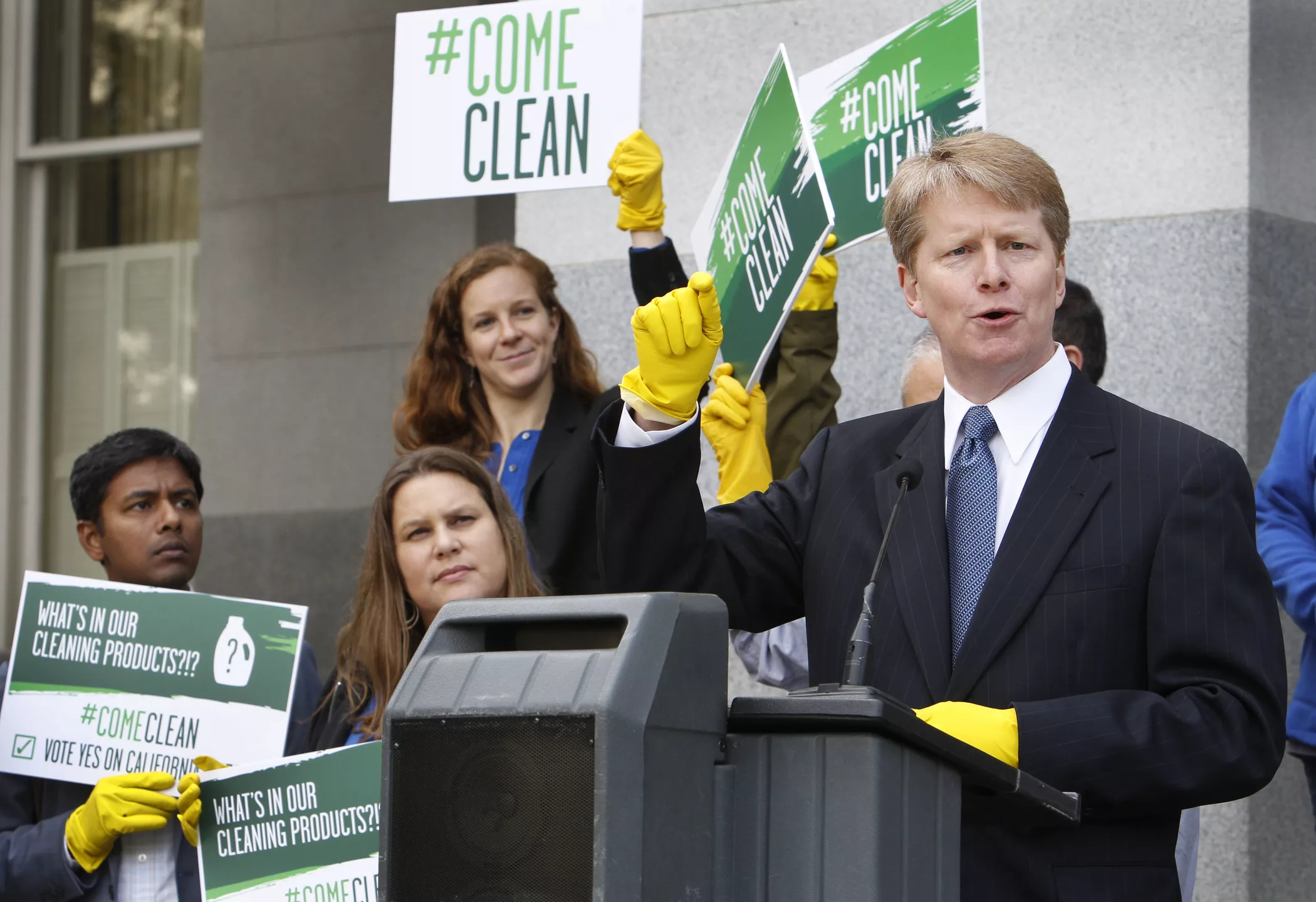Seventh Generation is one of the old-guard conscious companies. The household and personal care products maker has a strong commitment to the environment, to communities, and to standing up for causes it believes in. In September 2016, global giant Unilever announced it was acquiring the Vermont-based brand. A few months later, we caught up with Seventh Generation’s CEO John Replogle to get the scoop on how things have changed inside his company since the acquisition. We talked about the role of business in society, what it’s like to be a Best for the World B Corp within a larger brand, how Seventh Generation is using new forms of governance to preserve its mission, and more.
What role do you think companies should be playing in solving social problems and advocating policy these days, and in general?
John Replogle: I think it’s a duty for all companies to play a very active role. Some choose not to. If they have good reason I can respect , but I think we all have to realize the switch is “on.” If you’re not going to play a role, then consciously decide why you’re not going to be engaged. Otherwise, every company has a moral duty to play an active role. That’s true for a number of reasons.
One, we owe our businesses to the consumers around us, the people who purchase our products, the communities that give us the ability to do business. Business today is inextricably linked to society. Go back to John Locke, who says you can’t stand apart from, you have to be part of society. And we need the help of business more than ever.
After this beautiful experiment of democracy we’ve had for 250 years, it’s clear that government alone can’t do the job. There is an incredible need for business to play a leadership role here. I’ve often said that if every company adopts their home town we can solve every problem around us, and that’s what we aim to do at Seventh Generation.
What is the role of values and ethics in business more generally?
JR: Unless you have a clear ethical compass, as an organization you are bound to damage and destroy your business over the long-term. We’re seeing that happen time and time again. Whether it’s the Volkswagen debacle, or Japanese airbags, or Duke Energy and their coal ash pits. You look back over the last 100 years and fewer than a handful of the Fortune 500 still exist. Why do businesses perish in less than a century? I would argue that most of them (A) either don’t remain relevant in serving their community and their consumer, or (B) lose their way in terms of morals, ethics, and purpose.
What do you wish other CEOs and business leaders thought about more?
JR: One of the fundamental requirements of every CEO is to really understand why their company exists and to make that manifest to every employee. I wish they thought less about the bottom-line and more about how they run their business, what the core values and the purpose of their business is all about and how they can connect their employees and their core purpose to the core purpose of the organization. That is really going to be the success model for more and more businesses, and the distinguishing factor. That’s why you see so many benefit corporations flourishing, and purpose-driven companies outperforming the market.
It’s not just good ethical and moral responsibility; it’s good business to think that way. We’ve got to get beyond short-termism and start to think about what we’re trying to build for the long-term. That’s the definition of true sustainability.
What, if anything, has changed at Seventh Generation since Unilever bought you in the fall of 2016?
JR: With the new ownership, we have begun to open our eyes to the global opportunity for the brand. Since the acquisition we’ve launched in the UK. We’re redoubling our growth efforts in Canada. We’re building out an international team so we can build the global brand.
Second, as our board was sunset, we’ve stood up a “social mission board” that’s made up of our founder Jeffrey Hollender and our chairman Peter Graham, along with other members of the Unilever team and some outside experts who are guiding our business on our social mission.
Third, we’ve begun to explore how we work more collaboratively together, including finding areas for integration. Unilever’s supply chain holds great promise for us, not only to be more efficient and reduce costs, but also to lesson our eco-footprint as we move more products from less-than-truckload to full-truckload deliveries. We’re looking to integrate and align our supply chain, integrate our systems, and leverage the power of the Unilever sales organization to help extend the brand in the US and beyond.
Is there anything else you did during the acquisition process that has helped you ensure that you can maintain Seventh Generation’s core values over time?
JR: We’ve established as core principle that keeping that socially-minded ethos thriving at Seventh Generation is essential to the long-term success of the business. Unilever respects that and we are making that first-principle in everything we do as we build for the future. That’s along with setting up a social mission board, reinforcing our core values with all of our employees, and collaborating with the Unilever team that drives their sustainable living plan and sharing our best practices with them and they with us.
Tell us more about the social mission board. How does it work? What’s its power?
JR: Seventh Generation had a board that was responsible for both the social mission and the business performance. On the acquisition, that board was disbanded and the social mission board was established specifically to look after the fulfilment of our 2020 and 2030 goals and aspirations when it comes to transforming commerce, nurturing nature, building communities, and enhancing health. Those are our four core aspirations and the social mission board is looking at how we’re doing against those. They are responsible for the fulfilment of our corporate consciousness goals. The corporate consciousness team at Seventh Gen reports to me, and I report to that board. Our foundation also comes under the aegis of our social mission board.
What we’ve really got is a board that ensures we are focused on driving towards our mission and fulfilling our vision and living our values every single day in the way that we go about running our business. From a pure fiduciary responsibility, that reports in through Unilever and ultimately comes under the auspices of the Unilever board as a publicly traded company.
If the social mission board felt like things weren’t going well, what kind of recourse would they have to fix that?
JR: We’ve got clear stipulations within the social mission board charter for addressing any issues and escalating and resolving those issues through the Unilever system. There are three people from Unilever on the social mission board. One is Jostein Solheim, who’s the CEO of Ben & Jerry’s and a good partner to Seventh Gen. Then the global head of home care, Nitin Paranjpe, who is my boss, also sits on the social mission board. We’ve got good alignment and congruity of of business and mission.
Thanks for getting so in-depth on that.
JR: I’m happy to share because I hope it becomes a model others can follow and build on. We are not perfect by any means, but we’re doing our best to get it right. I’m in active learning mode to see how it goes and what we need to adjust as we go.
Before we entered into this, I did reach out to a number of other social entrepreneurs who had sold their business and asked them specifically about how they preserved and advanced their mission, their culture, etc., and got some good advice along the way. I remain open to doing that for anyone else who is contemplating such a change.
Will Seventh Generation stay a B Corp even though Unilever isn’t one?
JR: We remain a B Corp and Ben & Jerry’s is as well, and Unilever aspires to be one of the first global multinationals to become a benefit corporation. Paul Polman has been very clear on that objective. I think we may have to race Danone for that though.
It’s a good race.
JR: It’s a great race.
Was being a B Corp helpful or hurtful during the acquisition process, and how so?
JR: Tremendously helpful. Just codifying what you stand for allows you to build on and preserve it. I think a big reason Unilever was interested in Seventh Generation was because of our principles and the way we did business. It was very clear that our company had the attention of the CEO of Unilever. Not only have we driven great business performance, they love the way we’ve gotten it done and that was a big motivating factor for why they were interested in being our partner.
In what way does being part of a publicly traded global brand like Unilever help or hurt your ability to take a strong stand on potentially controversial issues?
JR: We’ve discussed this. At the end of the day, it should only help. In other words, Unilever never wants to be in the way of us taking a stand. You look at what Ben & Jerry’s has done over the past year in different things, from Black Lives Matter, which obviously Unilever deeply supports, to GMOs, which strikes a little closer to home . Ben & Jerry’s has been incredibly vocal and active in that space, just as we are on ingredient disclosure and transparency of chemicals.
You may have read recently that Unilever has made a sweeping announcement on ingredient disclosure for their products, a real leadership position in the industry, and I’d like to believe in some way Seventh Generation was a positive influence on that. Similarly, Target has made the same pronouncement.
So we’re really excited that a global corporation like Unilever and a global retailer like Target both can make this strong statement. I think it’s made us stronger in our advocacy as we go and continue that drive, or raise our voice on responsibility around climate change. Unilever is a great proponent and supporter of our advocacy in that space.
Yes, there will be times where we don’t fully align, but we have full permission to operate as we would . And where we do align, I think we become much stronger. We get a megaphone to amplify what we stand for with Unilever.
Can you tell us what conscious leadership means to you and why it’s important?
JR: How long do you have?
How long do you have?
JR: Conscious leadership, that’s such a broad term. Conscious leadership is more than just the CEO. Conscious leadership is about building a conscious culture, a culture of leaders. And if you’re really going to build a conscious culture, what you have to help people do is go on the journey of self-discovery, of driving for true self-insight. Asking people the deeper questions: why are you here? What’s your core purpose? How can you align your core purpose with the core purpose of the organization such they become richer and stronger together? How, through this communion of people, can we can help you advance and realize your core purpose? When you get the culture right and that happens and more people thrive, you build a conscious culture. And with that you build conscious leadership.
In many ways, my core role within the organization is about nurturing that culture and unleashing human potential to realize core purpose. It’s said that “your calling is where your greatest gifts meet the world’s great needs.” My hope is that everyone within Seventh Generation, and every employee within a conscious company, can realize their calling. It doesn’t have to happen outside the work hours, it should happen within the work hours. That’s a big part of what my role as leader or CEO of the company is: cultivating that culture where you can find and live your calling.
Outside the business, I need to be really clear on what our company stands for and how that translates into the way business should be done and how the company brings to life our mission and values but also leverages the power of our business for positive social change. So I spend a good bit of my time working to leverage the power of our company to make positive social change, within the community we serve, within the community of consumers who care about our brand, and on the broader stage of national and state policy.
What are your highest values and how do you act on those intentionally in the workplace?
JR: My core goal is to help people live richer and more fulfilled lives. Within Seventh Generation, that’s all about a healthier life. Fundamentally in my heart I believe you can’t live a healthy life on a sick planet, so for me the environment is such an incredibly important part of that formula. It’s about unlocking human potential, safeguarding and advancing human health, and protecting our precious planet. That’s what really matters to me.
Is there anything you’ve found particularly effective in terms of advocacy or getting the word out as a business leader on a specific issue?
JR: It all goes back to collective voice and collective actions through collaboration. And so we’re moving locally, banding together with other conscious Vermont companies to make positive impact on the carbon front in Vermont.
How do you build coalitions with other companies that you might traditionally see as a competitor? Why there is value in that?
JR: It starts with the realization that we’re in the post-competitive world. That there are new rules to the game. What I was taught at the Harvard Business School 25 years ago is no longer applicable. We’re not trying to maximize value, we try to maximize values. We are not trying to play zero sum, we’re trying to play win–win. We’re not structured to compete, we’re structured to collaborate.
It was this notion that we can internalize profits and externalize the cost. And once you realize that’s not a sustainable model — that business is connected to society — and you create that culture within your business, what begins to happen is you naturally become a much more collaborative business. You find that there are other players in the marketplace that share your values and you become more disposed to wanting to partner with them to advance those values. That’s why we move into so many positive partnerships with others, even with what one might call a traditional competitor. That’s how we advance our mission every day and I think that’s the movement. Companies that don’t embrace this will be left behind and will perish, and those that embrace it will flourish under these new rules. That’s now what is being taught on business school campuses and you see more and more employees seeking that in the companies they want to join and keep.
I’m optimistic — this is what gives me hope — that we’re going to see business rise up as a powerful social force in the decade ahead and make a huge positive difference around us.





